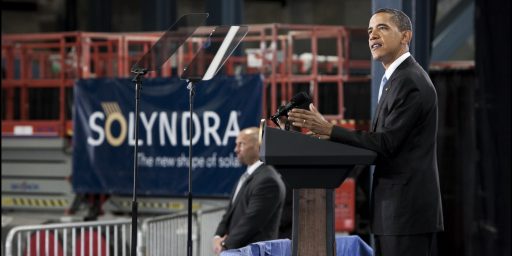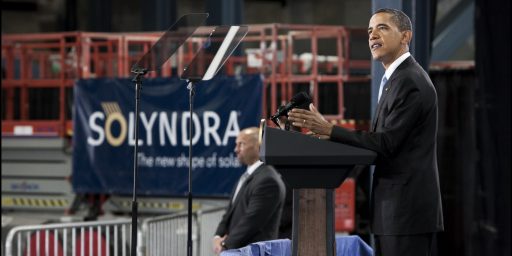Solyndra Executives To Invoke 5th Amendment In Congressional Testimony
Executives of bankrupt Solyndra, recipient of a half billion dollars government guaranteed loan in 2009, will refuse to testify pursuant to the 5th Amendment at a Congressional hearing on Friday:
Solyndra LLC’s chief executive and chief financial officer will invoke their Fifth Amendment rights and decline to answer any questions put to them at a Congressional hearing on Friday, according to letters from their attorneys obtained by Reuters.
In the letters sent to the House Energy and Commerce Committee’s Subcommittee on Oversight and Investigations, attorneys for Solyndra CEO Brian Harrison and CFO W. G. Stover said they advised their clients not to provide testimony during the hearings.
This is not all that surprising. As the executives of a Debtor in Possession under Chapter 11 of the Bankruptcy Code, these Executives could be subject to potential charges if there was any misrepresentation made in connection with the loan, or if there’s even the slightest discrepancy between their testimony and what they’ve filed in Bankrupt Court or told the United States Trustee. In addition to that, we already know that this matter is being investigated by the Departments of Energy and Justice and that only a week or so ago the FBI executed search warrants at the homes of Solyndra executives. Under these circumstances, any attorney who let their client testify under oath before Congress without blanket immunity being granted, which won’t happen of course, would be committing malpractice.
Allahpundit comments on the political angle:
How excited do you think the White House is, with public interest in Solyndra’s sweetheart federal loan peaking, for these two to decline to answer questions in full view of cable news cameras on grounds that doing so might place them in legal jeopardy? I can already see the YouTube montages — 20 or 30 iterations of “on the advice of counsel, I assert my Fifth Amendment privilege against self-incrimination” all stitched together, maybe with a photo of Obama looking constipated overlaid while the audio plays.
Perhaps, but there are plenty of reasons why someone might assert their 5th Amendment rights that have nothing to do with the possibility that they might have committed a crime. More importantly, invoking that privilege should never be interpreted as an admission of wrongdoing, although sadly I think that’s exactly how many on the right will interpret it and how the RNC, or some GOP SuperPAC, will spin it in the inevitable television ads to follow.







Doesn’t matter who’s testifying about what. Once you say “on the advice of counsel, I assert my Fifth Amendment privilege against self-incrimination” folks on the other side of the issue will take it to mean you are guilty.
However, I’d bet that little if anything comes out of a DOJ investigation, except maybe a statement saying that some of the folks involved should have done their due dilligence before signing off on the deal.
BTW, Brad Plumer in the Washington Post had an interesting piece, Five myths about the Solyndra collapse. He says right upfront that those who say the alleged shenannies with the loan is no big deal are wrong. But then he writes (the second and third myths):
Well, given that most of the convictions in these matters boils down to lying to a federal agent, the best course of action is to not speak to federal agents or provide statements under oath. Especially in a politically charged Congressional hearing.
It does little to help along the pursuit of the truth but at some point a prosecutor is going to want to hang them for something on the courthouse door to justify their prosecution, best not to hand them the rope.
@JKB:
I’d only add “except without counsel” to that first paragraph. There might be some circumstances where talking to the FBI or testifying might be okay, but doing either without legal counsel is just setting yourself up for trouble.
Of course, as Roger Clemens can tell you, even having an attorney sitting next to you and three more behind you isn’t going to stop someone from being completely stupid.
@JKB: “most of the convictions in these matters boils down to lying to a federal agent”
In this particular instance, I assume the problem is that every document submitted for the loan (and the refi of the loan) contained or referenced a bit of fine print that stated that this information is being presented as truthful under threat of criminal perjury. How do you know if someone is puffing as opposed to lying? Get them to talk about it . . ..
I don’t think its improper to use the invocation of the Fifth as evidence that something went seriously wrong with this project. We really have no idea whether a crime was committed.
I think that is way too fancy a building for a start-up. If I drove up as an investor and saw that, I’d turn around.
So, whom are they protecting? Themselves, or Obama?
The speculation is that they will do so because of the FBI investigation now working. Problem with that is that the FBI works at the behest of the White House.
Were I the cynical sort, I might suggest that the evidence in this case is going to be lost, or destroyed by a fire of suspicious origin while in FBI care.
The usual mantra is that the DOE’s loan guarantee program… a rather sloppy mess… is to blame. But we know the DOE was being pressured by the White House. So….
Does anyone suppose this won’t come up in the election?